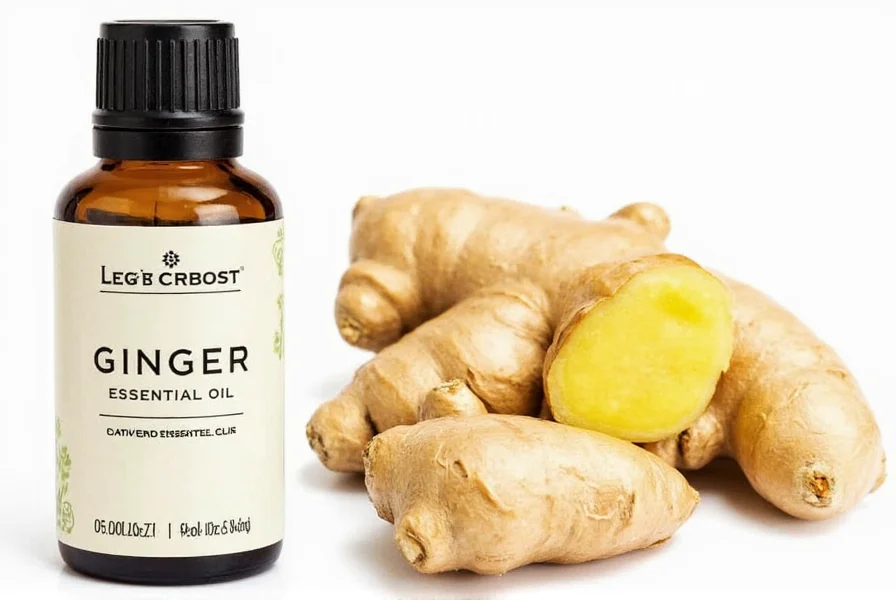Ginger essential oil has gained significant attention in complementary wellness practices for its distinctive spicy aroma and potential therapeutic properties. This concentrated plant extract captures the bioactive compounds of fresh ginger root in a highly potent form, requiring careful handling and informed usage to maximize benefits while minimizing risks.
What Exactly Is Ginger Essential Oil?
Unlike ginger root powder or fresh ginger, essential oil undergoes steam distillation to extract volatile compounds. The primary constituents include zingiberene (30-40%), β-bisabolene (15-25%), and α-farnesene (5-10%), which contribute to its characteristic scent and biological activity. This concentration process means ginger essential oil contains approximately 1.5% of the original plant material by weight, explaining why proper dilution is crucial for safe application.

Scientifically Supported Benefits and Applications
Research indicates several evidence-based applications for ginger essential oil. A 2022 meta-analysis published in Complementary Therapies in Medicine confirmed its effectiveness for nausea management, particularly for motion sickness and postoperative nausea. The mechanism appears related to 6-gingerol and 6-shogaol compounds influencing serotonin receptors in the gastrointestinal tract.
For digestive support, ginger essential oil may help alleviate bloating and indigestion when used in aromatherapy. A clinical trial involving 60 participants with functional dyspepsia showed significant symptom improvement after inhaling ginger oil for 15 minutes following meals. This makes how to use ginger essential oil for digestion a frequently searched application method.
| Application Method | Dilution Ratio | Recommended Frequency |
|---|---|---|
| Topical (abdomen massage) | 1-2 drops per Tbsp carrier oil | 2-3 times daily |
| Inhalation (diffuser) | 3-5 drops per 100ml water | 15-20 minutes as needed |
| Bath | 5-7 drops with 1 Tbsp carrier oil | 2-3 times weekly |
Safety Considerations and Proper Usage
Understanding how to dilute ginger essential oil properly is critical for safe use. Undiluted application can cause skin irritation, burning sensations, or contact dermatitis in sensitive individuals. The maximum safe dermal concentration is 0.8% for leave-on products according to the International Fragrance Association.
Special populations require particular caution. While many search for information about is ginger essential oil safe during pregnancy, current evidence suggests avoiding it during the first trimester. The American College of Obstetricians and Gynecologists notes that while ginger supplements are generally safe for pregnancy nausea, essential oil concentrations lack sufficient safety data for early pregnancy.
Those taking blood-thinning medications should consult healthcare providers before using ginger essential oil, as it may enhance anticoagulant effects. Similarly, individuals with gallstones should exercise caution as ginger may stimulate bile production.
Choosing Quality Ginger Essential Oil
Selecting authentic ginger essential oil requires attention to labeling details. Look for products specifying Zingiber officinale as the botanical name and indicating steam distillation as the extraction method. Reputable companies provide GC/MS (gas chromatography/mass spectrometry) reports verifying composition.
Be wary of products labeled "fragrance oil" or those priced significantly below market rate, as these often contain synthetic additives. Pure ginger essential oil typically costs $8-$15 per 5ml bottle from legitimate suppliers. When searching for the best carrier oils for ginger essential oil, consider fractionated coconut oil, jojoba oil, or sweet almond oil for their neutral scent and skin compatibility.

Practical Application Methods
For immediate nausea relief, create a personal inhaler with 10 drops ginger oil and 5 drops peppermint oil in a aromatherapy inhaler tube. During travel, place two drops on a tissue and inhale as needed. For digestive support after meals, diffuse 3 drops ginger oil with 2 drops fennel oil for 15 minutes.
When developing ginger essential oil diffuser recipes for immune support, combine 4 drops ginger, 3 drops eucalyptus, and 2 drops lemon in your diffuser during cold season. Remember that essential oils don't cure illnesses but may support wellness practices.
Recognizing Adverse Reactions
While generally safe when used properly, ginger essential oil can cause adverse effects. Monitor for skin redness, burning sensations, or respiratory irritation. Discontinue use immediately if any adverse reaction occurs. Always conduct a patch test by applying diluted oil to a small skin area and waiting 24 hours before broader application.
Understanding potential ginger essential oil side effects helps prevent complications. Some users report heartburn when using high concentrations internally (though internal use isn't recommended without professional guidance). Those with sensitive skin may experience irritation even with proper dilution.
Frequently Asked Questions
Can I use ginger essential oil directly on my skin?
No, ginger essential oil should never be applied directly to skin without dilution. Always use a 1-2% dilution (1-2 drops per teaspoon of carrier oil) for topical applications to prevent skin irritation or sensitization.
How effective is ginger essential oil for morning sickness?
Clinical studies show ginger essential oil can reduce pregnancy-related nausea by 30-40% when used in aromatherapy. However, consult your healthcare provider before use during pregnancy, especially during the first trimester when safety data is limited.
What's the difference between ginger essential oil and ginger supplements?
Ginger essential oil contains concentrated volatile compounds extracted through distillation, while supplements typically contain powdered ginger root or standardized extracts. Essential oil is significantly more potent and requires dilution, whereas supplements provide standardized doses of specific compounds like gingerols.
How should I store ginger essential oil to maintain potency?
Store ginger essential oil in dark glass bottles away from direct sunlight at room temperature (60-75°F). Properly stored, it maintains potency for 1-2 years. Refrigeration can extend shelf life but may cause temporary cloudiness that resolves at room temperature.











 浙公网安备
33010002000092号
浙公网安备
33010002000092号 浙B2-20120091-4
浙B2-20120091-4